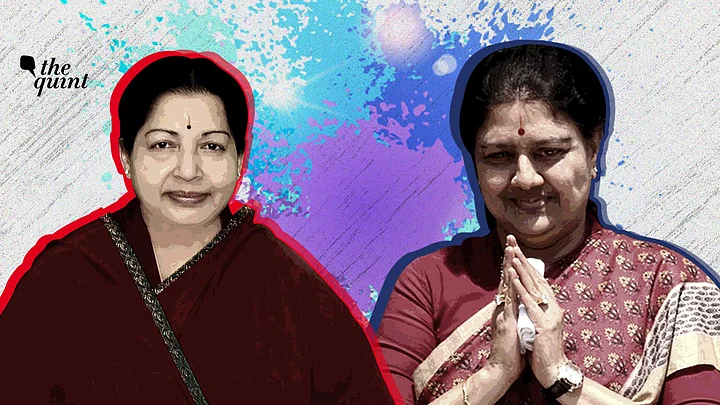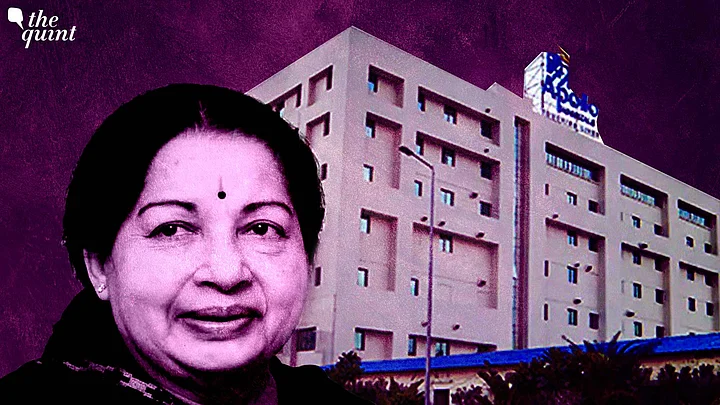It has been over six years since J Jayalalitha passed away, leaving a void in her home state Tamil Nadu and in the Indian political scene.
Now, Justice A Arumughaswamy Commission of Inquiry into the circumstances surrounding the death of the former chief minister has found her aide VK Sasikala, doctors of Apollo Hospital, Chennai, and four others including the then Health Minister Dr Vijayabaskar “at fault.”
Here's a timeline of events – from Jayalalithaa's hospitalisation to her death – which The Quint put together based on the commission's observations. So far, Tamil Nadu government has not given its view on the commission's report that has recommended further probe on Sasikala, doctors at Apollo Hospital, and former Health Minister and Health Secretary.
The report was tabled in the state's Legislative Assembly on 18 October.
From Jayalalithaa's Fever to Sudden Hospitalisation
19 September
VK Sasikala, in her statement, said that Jayalalithaa was suffering from fever.
20 September
Following the advice of Dr KS Sivakumar, Jayalalithaa's doctor who also practiced at Apollo Hospitals, she was administered paracetamol at regular intervals but her condition did not improve.
21 September
Despite her indisposition, Jayalalithaa went to the Secretariat to attend the inauguration of seven buses and a metro train function. Sasikala had advised her to skip the visit, but the late CM had insisted to attend it as Union Minister Venkaiah Naidu was also participating in the function. On her way home, Jayalalithaa told her driver that she was feeling uncomfortable. While getting off the car, she lost her balance and was about to fall down.

(Image: Reuters)
22 September
Her fever worsened and Dr Sivakumar came to her residence at Poes Garden at about 11 am. He was informed that she was alright and so he did not personally examine the late CM. As the fever didn’t subside, he was called to her house again at 8.45 pm. After the checkup, Jayalalithaa went to the bathroom, called out to Sasikala and fainted.
An ambulance was rushed to their home. Oxygen was administered at home before Jayalalithaa was rushed, on a stretcher, to the hospital.
A preliminary diagnosis of infection, dehydration, respiratory distress, swelling in her leg, low oxygen in blood, blood leakage on the left side of the heart, vegetation, were made. She was already suffering from uncontrollable diabetes, fluctuating Blood Pressure, thyroid, obesity, irritable bowel syndrome, diarrhea, and bronchitis.
Shortly after the admission it was diagnosed that she had developed “sepsis” on account of urinary infection.
From Cauvery River Water Meeting to Ventilator Support
27 September
The Cauvery River Water issue meeting was held in the treatment room for about 45 minutes. The Chief Secretary convinced the late CM for taking a photograph for it to be published and she agreed. But the Chief Security Officer Perumalsamy advised against it.
Later that night, she suffered a setback and the doctors detected perforation in the heart.
28 September
Sasikala said that Jayalalithaa had “trouble talking and breathing” and so she was connected to the ventilator. Dr Ram Gopalakrishnan and Dr Rajeev Soman from the Infectious Diseases department from Apollo Hospital and Mumbai respectively, diagnosed that she was suffering with perforation and vegetation and recommended early valve surgery.
Apollo Hospital Chairman C Pratap Reddy has said that the details of her health condition were regularly relayed to the government, through IAS officers, on a daily basis.
From Recommended Foreign Treatment to AIIMS Doctors' Arrival
1 October
Apollo Hospital obtained an expert opinion from Dr Richard Beale, a specialist from the Guy’s and St. Thomas’ Hospital, London. He noticed sepsis as well as vegetation and stated that, heart attack or stroke may happen if these were not attended to. He advised that Jayalalithaa be taken abroad for treatment and that he would accompany her in the air-ambulance.

Dr Richard Beale, a specialist from the Guy’s and St. Thomas’ Hospital, London.
(Image: Research Gate)
Later, during the course of enquiry, the commission was told by Dr Senthil Kumar that the doctors at Apollo Hospitals could not take a call on taking her abroad for treatment and only the state officials had to take a decision in this regard. AIADMK legislator Manoj Pandian told has also the commission that no unanimous opinion was arrived at in taking the CM abroad for treatment, the report stated.
By the third week of October 2016, Jayalalithaa's “health condition was not fit to travel abroad.”
3 October Former Chief Minister Dr Kalaignar M Karunanidhi commented that a photograph of the meeting on the Cauvery issue needs to be released as that will put an end to the rumours and the mystery over Jayalalithaa's treatment and health condition.
5 October
A team of doctors from All India Institute Of Medical Sciences (AIIMS) visited and supervised the treatment given by Apollo hospitals. In the five times they visited, they did not give any treatment nor prescription to the late CM, but only supervised the treatment.
7 October
A tracheostomy was done. Sepsis was completely cured by this time.
11 October
Dr Stuart Russell a cardiologist of John Hopkins Institute in USA, over a telephonic conversation, advised coronary angiogram.
13 October 2016
Dr Beale along with a team from All India Institute of Medical Sciences (AIIMS) visited Apollo Hospital to examine Jayalalithaa again.
From Apollo Press Conference to Angiogram & Surgery That Were Never Performed
11 November
Pratap C Reddy, the Chairman of the Apollo Hospital gave a press interview stating Jayalalithaa's infection was fully under control and that she could be discharged soon. The commission's report has noted that the press interview among several other medical bulletins shared with the public, “gave an impression that the late CM was out of danger and she was perfectly alright,” but the truth “was absolutely otherwise.”
13 November Dr Sajan Karunakar Hedge was called for the complaint of back pain and he prescribed pain-relievers for a few days. If the pain persisted, she had to undergo an MRI Scan, but she recovered while on tablets.
25 November
Dr Samin Sharma, Thoracic Surgeon from USA, agreed to do an angiogram and even convinced Jayalalithaa to go ahead with the valve surgery. Dr Stuart Russell from The Johns Hopkins Hospital too, recommended the same.
But Dr Babu Abraham of Apollo Hospital, claimed that when he contacted Dr Beale over the phone, the latter stated that there was no need for surgery then, as she was improving.
The commission has found this suspicious as there were no records or clear reasons explaining why Dr Beale changed his recommendation. Though cardiologists like Dr MR Girinath, Dr KM Cherian, and the AIIMS Medical Board have said there was no need for an angiogram, the report has noted that these doctors did not meet Jayalalithaa personally.
The commission noted that till 25 November, the late CM was fit for surgery as per Apollo's own records, but no cardiothoracic surgeon had been allowed to see her.

A picture of Jayalalithaa in the hospital was leaked.
(Image: Accessed by The Quint)
3 December 2016
Dr Nikhil Tandon, Department of Endocrinology, AIIMS, along with the three doctors noted that she was making good progress and undergoing physiotherapy regularly. He had stated that angiogram should not be done.
The commission questioned why “none had taken any steps right from 28 September till her death to take a simple angiogram, which would have revealed whatever defect, if any, was there.”
From Cardiac Arrest to Declaration of Death
4 December 2016
The AIADMK said the chief minister will return home soon, following a confirmation by an AIIMS experts team that she had completely recovered.
Multiple statements by the treating doctors show that this was incorrect as hours later she suffered a cardiac arrest.
On the morning of 4 December, Jayalalithaa had consumed cornflakes at around 11.30 am. A short while later, at 2 pm, a weeping sound was heard from the room, following which doctors and Sasikala rushed in.
Dr Rama Devi, who was present in the room at the time, said Jayalalithaa suffered a cardiac arrest. Cardiopulmonary Resuscitation (CPR) was immediately initiated with immediate nebulisation but she did not respond to the treatment.
It was noted that her heart alone vibrated, there was no blood circulation, no bleeding or circulation of blood, which “inevitably pointed to the conclusion that late CM was no more.”
She was then placed on Extra Corporeal Membrane Oxygenation (ECMO) at 5:30 pm.
5 December 2016
Jayalalithaa was assessed by the Cardiothoracic and ECMO teams and “it was noticed that she had very little brain stem function in pupillary reflex and mild gag reflex, eye and corneal reflex were absent. Her heart function was deteriorating.”
Dr Preetha Reddy of Apollo Hospital told the commission that a detailed discussion was held and they all came to the consensus that continuing organ supportive care “may be futile.”

The commission concluded that the final hours of ECMO support was just a “ploy to explain away the delay in the official declaration of her death.”
(Image: Smitha TK/ The Quint)
The commission has concluded that the treatment was just a “ploy to explain away the delay in the official declaration of her death.”
While the hospital authorities declared her dead on 5 December at 11.30 pm, evidence has shown that she suffered a cardiac arrest on 4 December and passed away at between 3 and 3.50 pm, the report stated.
(At The Quint, we question everything. Play an active role in shaping our journalism by becoming a member today.)







